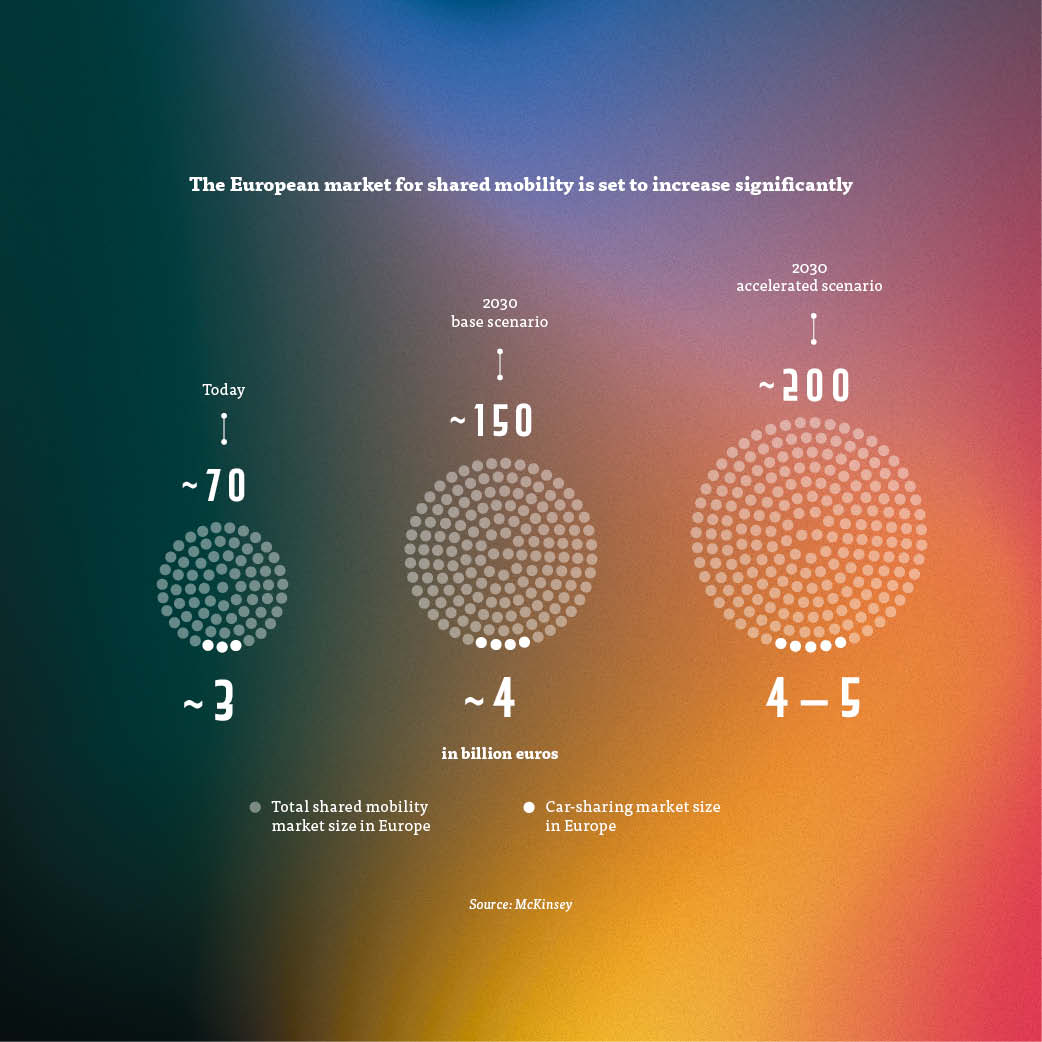The so-called sharing economy trend is profoundly changing our society and economic system. Ownership is becoming less and less of a goal, especially for millennials, who are more focused on the purpose of an item or device. This philosophy is also playing an ever greater role in shaping mobility.
For more and more people, what you do with an item or device is becoming increasingly more important than owning it. The (user) experience is more important to them than ownership. The consumption-critical younger generation, in particular, is displaying an increasing tendency to borrow what they need and only when they need it.
Nowadays, it is possible to find numerous examples of this “sharing” trend: if you need accommodation for a holiday, you look on Airbnb. When you need to drill a hole in a wall, you just borrow a drill from a rental company. Even designer clothing is shared in the sharing economy: you can rent a ball gown for just a few euros.
Saving money and the environment
One of the leading drivers for the success behind sharing services is the growing global awareness that excessive consumption has ecological, social and financial consequences. The sharing economy can be seen as the answer to resource scarcity and it prevents waste. But saving money is also an important motivation for using sharing services.
These two motivations come together in the mobility sector: owning a car is too expensive for many people, especially when it is not an everyday necessity. And a lot of millennials see private car ownership as something that consumes an immense amount of resources and is the main cause of emissions. Urbanisation is driving this trend even further: in large urban areas, owning your own car is becoming harder due to factors such as parking, usage restrictions and insurance costs. As a result, the demand for shared-use vehicles will continue to increase, while the number of privately owned vehicles will decline.
Shared mobility is on the rise
More and more people are using sharing services to get from A to B. Alongside traditional methods such as car-sharing agencies or taxis, new concepts have been appearing over recent years: either the vehicle is shared by several people, which is called car sharing, or the route is shared with other people who want to make a similar journey, which is known as ride-sharing or ride-pooling. According to the German car sharing industry association “Bundesverband Carsharing e.V.”, 3.4 million authorised drivers are currently registered with a car-sharing agency. This is 18 percent more than last year and an impressive number for such a car-driver-heavy nation like Germany. The drivers who have signed up to these car sharing services share a combined 30,200 vehicles across Germany.
Gunnar Nehrke, Managing Director of Bundesverband Carsharing e.V., sees the current discussion around climate change as a reason for this growth:
“By 2045, we need to have reached zero emissions in the transport sector. To achieve this, we need to shift a huge proportion of current car traffic volumes to environmentally friendly means of transport. We need to reach the stage where, for the vast majority of households, the car is no longer their regular, habitual means of transport, and instead is just one mobility option that they choose for a particular purpose. Car sharing is an appropriate and indispensable solution to achieving this.”
But it is not only cars that are being shared. E-scooters and bikes are already available in many cities as a quick mobility solution. According to a study by the Oliver Wyman Forum and the Institute of Transportation Studies at the University of California in Berkeley, the global market for shared mobility will grow by 40 percent by 2030. The amount of revenue that companies will make from car, bike and scooter sharing services, as well as services such as vehicle charging, is set to total around 660 billion dollars. By way of contrast, in 2020, the market volume stood at 260 billion US dollars.
Technology is changing mobility
Technology is playing a major role in the sharing economy revolution, especially “peer-to-peer” systems, which are digital systems that connect people with one another. The next big thing will be autonomous taxis (known as “robo-taxis”) and airborne versions which in recent months have made a huge leap towards becoming a reality. Robo-taxis and shuttles will fulfil the same function as today’s e-hailing and taxi services, but will have autonomous driving technology instead of human drivers. Many companies, including start-ups, are investing in the research and development of this technology – not just from the automotive industry but also from the mobility industry, the high-tech sector, the software industry and other areas.
One of the key findings from the international WeTalkData study conducted by MHP, Fraunhofer IAO and Motorpresse Stuttgart was that over 70 percent of people surveyed could imagine giving up their car in favour of autonomous mobility solutions.
These autonomous mobility solutions can come in many different forms: they include VIP shuttles (specially designed for individual mobility), People Movers (shared minibuses with space for 10 to 15 people), comfort shuttles and mini vehicles (with a focus on shared mobility for two to four people). Because driver salaries today make up between 40 and 50 percent of the price of a trip, it is expected that robo-taxi services will be able to compete with these driver-based services in terms of price – and maybe even with the total costs of owning a car.




